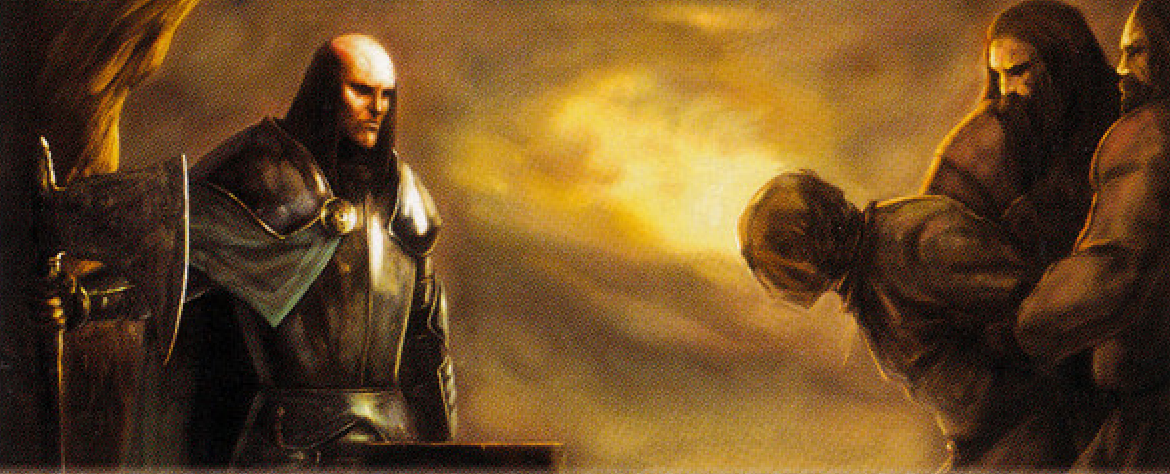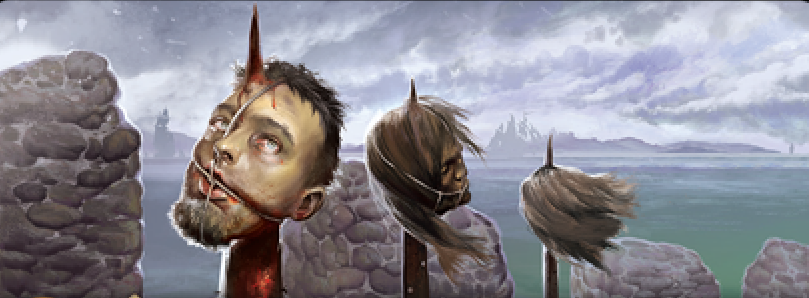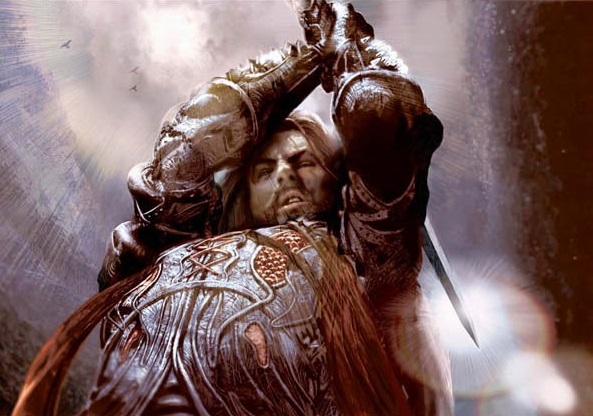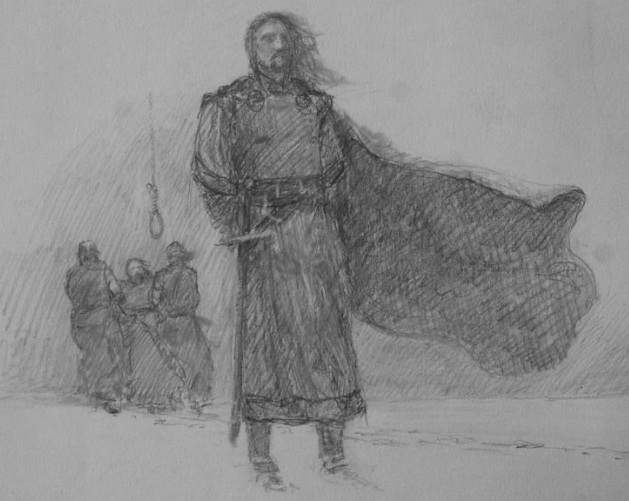Mudanças entre as edições de "Lei e justiça"
| Linha 15: | Linha 15: | ||
==Administração== | ==Administração== | ||
| − | + | As leis são aplicadas em vários graus dependendo da disposição do senhor local ou do status do acusado. Uma vez que a maioria dos erros pode ser expulso pelo pagamento de uma multa, pessoas ricas geralmente podem sair com coisas que os plebeus não conseguem. Isto é especialmente verdadeiro se o acusado é de alto status e comanda influência e poder. Em alguns casos, negligenciar uma ofensa é no melhor interesse do senhor local. | |
Additionally, highborn such as lords and nobles are afforded more rights by law: they cannot be denied trials{{Ref|aGoT|33}} and are allowed more leniency in their conduct.<!--more elaborate trials, Several lords sitting to pronounce judgements, witnesses and cross-examinations... details from ned trial, judges etc, if anyone rereads this part please add details.--> | Additionally, highborn such as lords and nobles are afforded more rights by law: they cannot be denied trials{{Ref|aGoT|33}} and are allowed more leniency in their conduct.<!--more elaborate trials, Several lords sitting to pronounce judgements, witnesses and cross-examinations... details from ned trial, judges etc, if anyone rereads this part please add details.--> | ||
| − | An accused highborn may demand [[ | + | An accused highborn may demand [[julgamento por combate]]{{Ref|aGoT|38}} or the less used [[trial of seven]] and let the gods give judgement.{{Ref|aGoT|47}} "Taking the black", to join the [[Night's Watch]], is an alternative to criminal punishment.{{Ref|aGoT|3}} By taking the black, one’s crimes are forgiven and he is exiled to the wall severing all previous ties. Women are not allowed to take the black. Only a knight of the Kingsguard can champion a queen in a trial by battle if she has been accused of treason.{{Ref|aFfC|43}} |
The legal majority for men and women is 16.<ref>[[So Spake Martin]]: [http://www.westeros.org/Citadel/SSM/Entry/Age_of_Majority/ Age of Majority (November 04, 1999)]</ref> Trials, at least among the nobility, often begin with a prayer from a septon beseeching [[Father (the Seven)|the Father Above]] to guide them towards justice.{{Ref|aSoS|66}} The accused and witness are sworn to honesty before he gives testimony at a trial.{{Ref|aSoS|66}} Of old, the High Septons might appoint seven judges to try a case, and if a woman was accused, three of them might be women, representing maidens, mothers, and crones.{{Ref|aFfC|43}} | The legal majority for men and women is 16.<ref>[[So Spake Martin]]: [http://www.westeros.org/Citadel/SSM/Entry/Age_of_Majority/ Age of Majority (November 04, 1999)]</ref> Trials, at least among the nobility, often begin with a prayer from a septon beseeching [[Father (the Seven)|the Father Above]] to guide them towards justice.{{Ref|aSoS|66}} The accused and witness are sworn to honesty before he gives testimony at a trial.{{Ref|aSoS|66}} Of old, the High Septons might appoint seven judges to try a case, and if a woman was accused, three of them might be women, representing maidens, mothers, and crones.{{Ref|aFfC|43}} | ||
Edição das 03h19min de 3 de setembro de 2017

Lei e Justiça nos Sete Reinos são largamente definidos pelo seu sistema sistema feudal do governo local.
Sistema Jurídico
Lordes têm poder judicial em casos que surgem em seus domínios. Enquanto os cavaleiros da região são, por vezes, Lordes em tudo, exceto no nome, apenas os Lordes têm o direito de administrar a alta justiça por pena capital.[1][2]
É dever de um lorde manter a paz, ouvir petições e fazer justiça e castigos, tudo em nome de seu lorde e, em última instância, em nome do rei. O lorde ou seus oficiais mantêm tribunais locais, ouvem petições e acusações e governam com base nas provas e na lei. Os lordes podem confiar tarefas a seus senhores juramentados, cavaleiros e oficiais de justiça, para ajudá-los a manter a paz, executar julgamentos locais e supervisionar as execuções. [3] Se o lorde não conseguir dar a sentença, cabe ao lorde da grande casa dominar aquela área [4] e, eventualmente, o rei para sentenciar, como a autoridade final.
Enquanto a Conquista de Aegon uniu a maior parte de Westeros sob um só rei, Aegon optou por respeitar as leis locais de cada região e deixá-las no lugar. Aegon também criou a posição de Mestre das Leis no Pequeno Conselho. Não foi até o reinado de Jaehaerys I Targaryen que os Sete Reinos foram trazidos sob um único código de lei. [5] Dorne permaneceu independente, e quando finalmente se juntaram aos Sete Reinos, uma de suas condições era que "a lei dornesa sempre governaria em Dorne". [6]
Administração
As leis são aplicadas em vários graus dependendo da disposição do senhor local ou do status do acusado. Uma vez que a maioria dos erros pode ser expulso pelo pagamento de uma multa, pessoas ricas geralmente podem sair com coisas que os plebeus não conseguem. Isto é especialmente verdadeiro se o acusado é de alto status e comanda influência e poder. Em alguns casos, negligenciar uma ofensa é no melhor interesse do senhor local.
Additionally, highborn such as lords and nobles are afforded more rights by law: they cannot be denied trials[7] and are allowed more leniency in their conduct.
An accused highborn may demand julgamento por combate[8] or the less used trial of seven and let the gods give judgement.[9] "Taking the black", to join the Night's Watch, is an alternative to criminal punishment.[10] By taking the black, one’s crimes are forgiven and he is exiled to the wall severing all previous ties. Women are not allowed to take the black. Only a knight of the Kingsguard can champion a queen in a trial by battle if she has been accused of treason.[11]
The legal majority for men and women is 16.[12] Trials, at least among the nobility, often begin with a prayer from a septon beseeching the Father Above to guide them towards justice.[13] The accused and witness are sworn to honesty before he gives testimony at a trial.[13] Of old, the High Septons might appoint seven judges to try a case, and if a woman was accused, three of them might be women, representing maidens, mothers, and crones.[11]
Sentencing
The punishment for treason[14] and oathbreaking is death.[15] Poachers may lose a hand. It is customary for thieves to lose a finger, but harsher punishments may be doled out depending on the circumstances.[16] Various mutilations for assault, castration for rape,[17] and floggings for minor offences are usual.
Executions are usually carried out by hanging or beheading. For harsher crimes the "crow cage" is used, in which the victim is imprisoned without food or water until death. Its name comes from the crows who often end up feasting on the criminal's flesh.[18][4]
Flogging is the common punishment for members of the lower social classes, its severity determined by both the number of strokes.
Flaying has been outlawed since the Boltons bent the knee to the Starks, but continues to be practised unofficially.
References and Notes
- ↑ O Cavaleiro dos Sete Reinos, A Espada Juramentada.
- ↑ So Spake Martin: Knights and Lords (March 02, 2002)
- ↑ A Tormenta de Espadas, Capítulo 22, Arya.
- ↑ 4,0 4,1 O Cavaleiro dos Sete Reinos, O Cavaleiro Andante.
- ↑ O Mundo de Gelo e Fogo, Referência errada.
- ↑ O Festim dos Corvos, Capítulo 2, O Capitão dos Guardas.
- ↑ A Guerra dos Tronos, Capítulo 33, Eddard.
- ↑ A Guerra dos Tronos, Capítulo 38, Tyrion.
- ↑ A Guerra dos Tronos, Capítulo 47, Eddard.
- ↑ A Guerra dos Tronos, Capítulo 3, Daenerys.
- ↑ 11,0 11,1 O Festim dos Corvos, Capítulo 43, Cersei.
- ↑ So Spake Martin: Age of Majority (November 04, 1999)
- ↑ 13,0 13,1 A Tormenta de Espadas, Capítulo 66, Tyrion.
- ↑ A Tormenta de Espadas, Capítulo 36, Davos.
- ↑ A Guerra dos Tronos, Capítulo 1, Bran.
- ↑ O Festim dos Corvos, Capítulo 14, Brienne.
- ↑ A Guerra dos Tronos, Capítulo 13, Tyrion.
- ↑ A Tormenta de Espadas, Capítulo 14, Catelyn.



